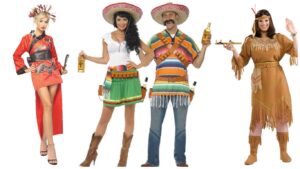
Halloween is known as a day of activities like trick-or-treating, carving jack-o-lanterns, festive gatherings, donning costumes, and eating treats. However, what may be seen as innocent fun for some, can turn into a literal nightmare for others.
Cultural appropriation can be defined as, the unacknowledged or inappropriate adoption of the customs, practices, ideas, etc. of one person or society by members of another and typically more dominant people or society. This form of appropriation has been an issue in America for centuries, particularly during Halloween.
Oftentimes cultural appropriation is done by white Americans at the expense of another culture or ethnic group. Mexican heritage has seen its fair share of appropriation, with people dressing up as Day of the Dead representations and wearing ponchos and sombreros. The stereotypes are distasteful.
Alongside the Mexican culture, Native-Americans have borne the brunt of a lot of harsh stereotypes and appropriation during the holidays as well. With people dressing with feather garnished headbands or dressing as the iconic Disney princess “Pocahontas’, many don’t know where to draw the line.
Chinese culture isn’t left out of this appropriation fest, with many Americans garnishing themselves in geisha face paint and wearing culturally significant dresses or throwing chopsticks in their hair.
There truly is a lack of regard for other cultures when it comes to selecting a costume for Halloween night. #NotYour Costume has begun trending on Twitter, as some cultures have begun taking a stand against the offensive behavior. While some see the overstepping as appropriation, others are questioning whether or not it’s appreciation. Leaving many to question: How far is too far?
One way to be sure you don’t overstep these boundaries is to examine the following: If you aren’t sure if you should be wearing something or if you have to ask yourself if a costume is offensive, then it’s best to not wear it at all.
Senior accounting major, Savannah Clemmons feels that it is extremely disrespectful, especially when bodypaint comes into play.
“People that aren’t Black or brown can ‘pretend’ to be for one day of the year, but there are so many people who can’t just put on or take off the costume, they have to live with everything that comes with being Black or brown in America,” Clemmons said. “Our culture is not your costume.”
“Our culture is not your costume,” is a saying you will typically see used throughout Halloween as a gentle reminder to be respectful of cultures during the holiday. With Covid-19 looming over, many are wondering if they will even get a chance to show off their costumes.
According to the CDC, “Many traditional Halloween activities can be high-risk for spreading viruses. But, there are several safer, alternative ways to participate in Halloween.” Regardless of how you spend this quarantined Halloween, there is nothing as scary as going viral for a careless costume. So, be smart and make sure you don’t overstep any cultural boundaries with your trick-or-treat fit.